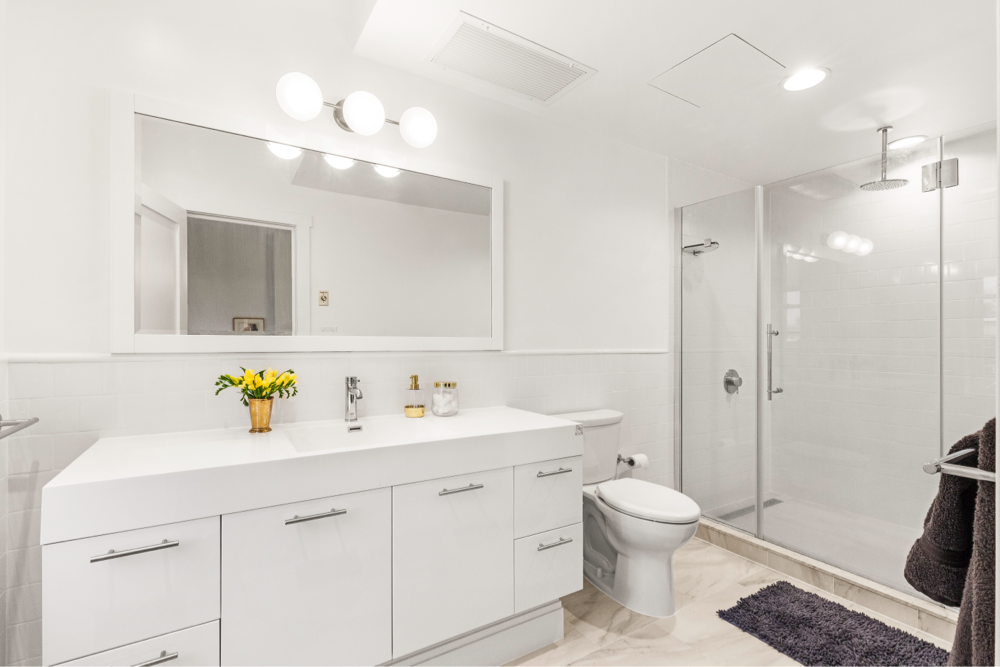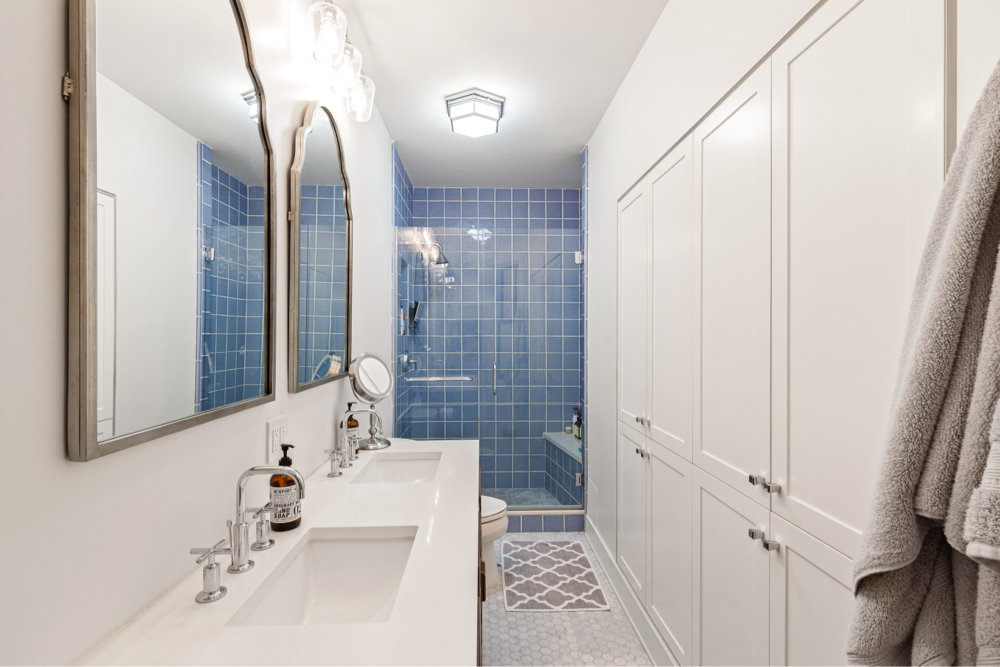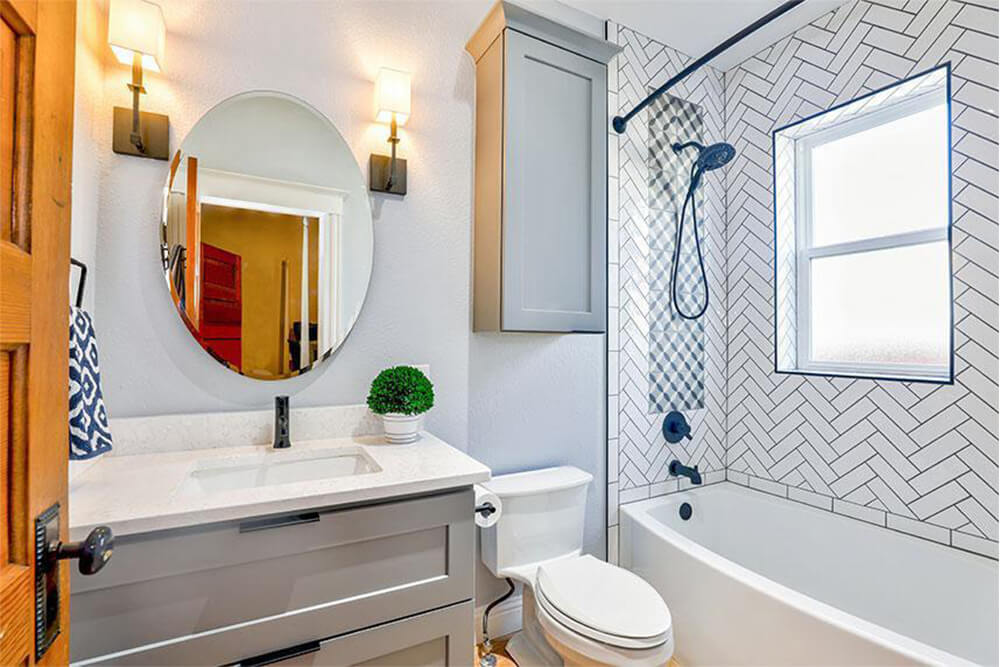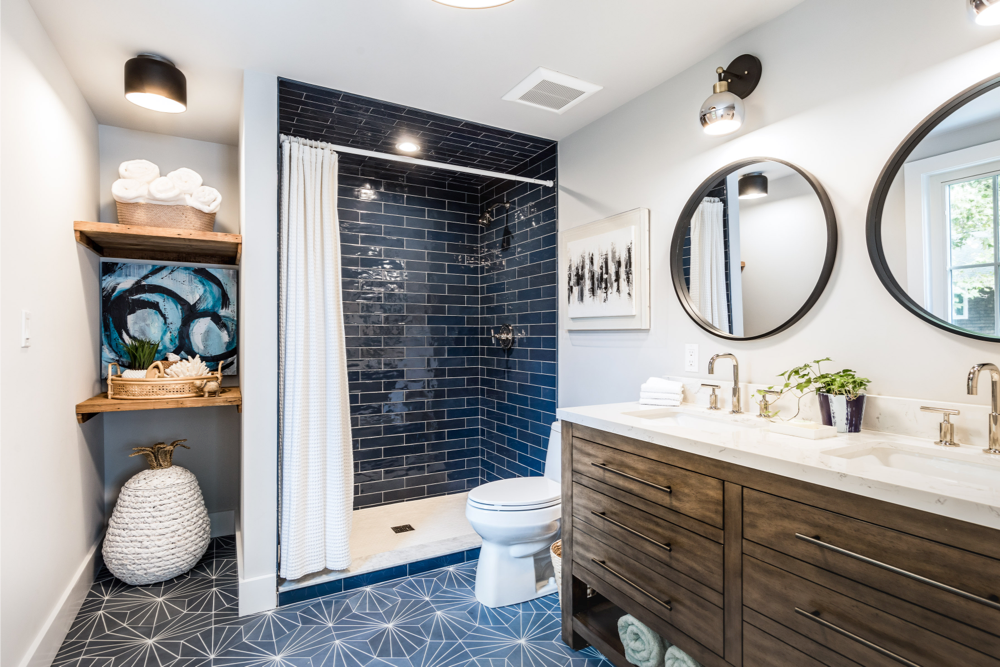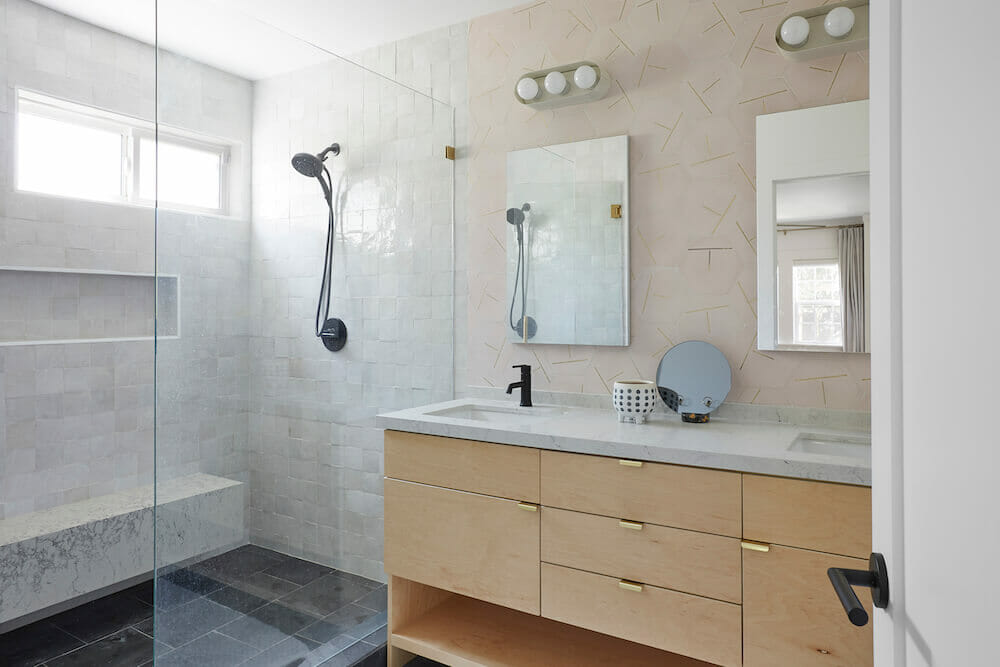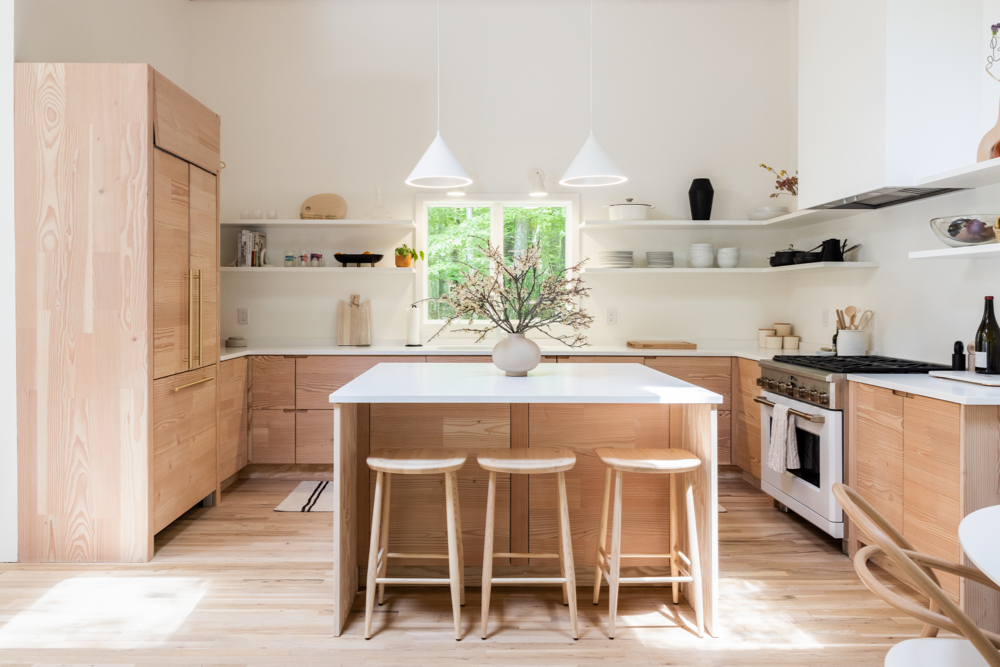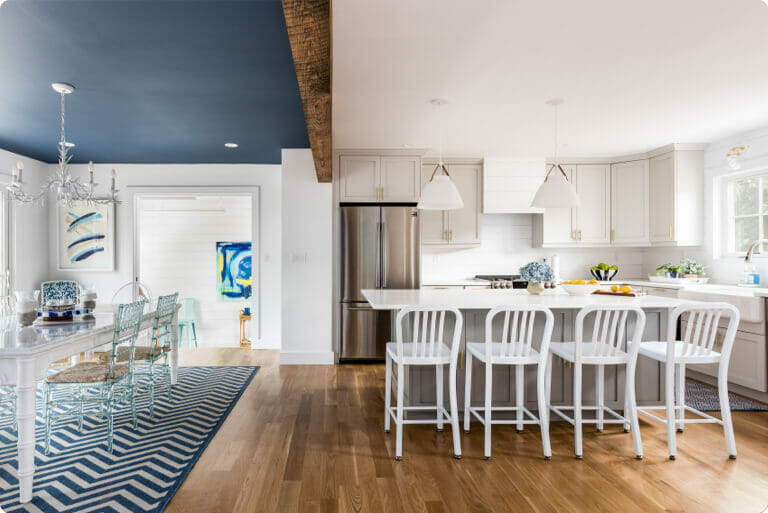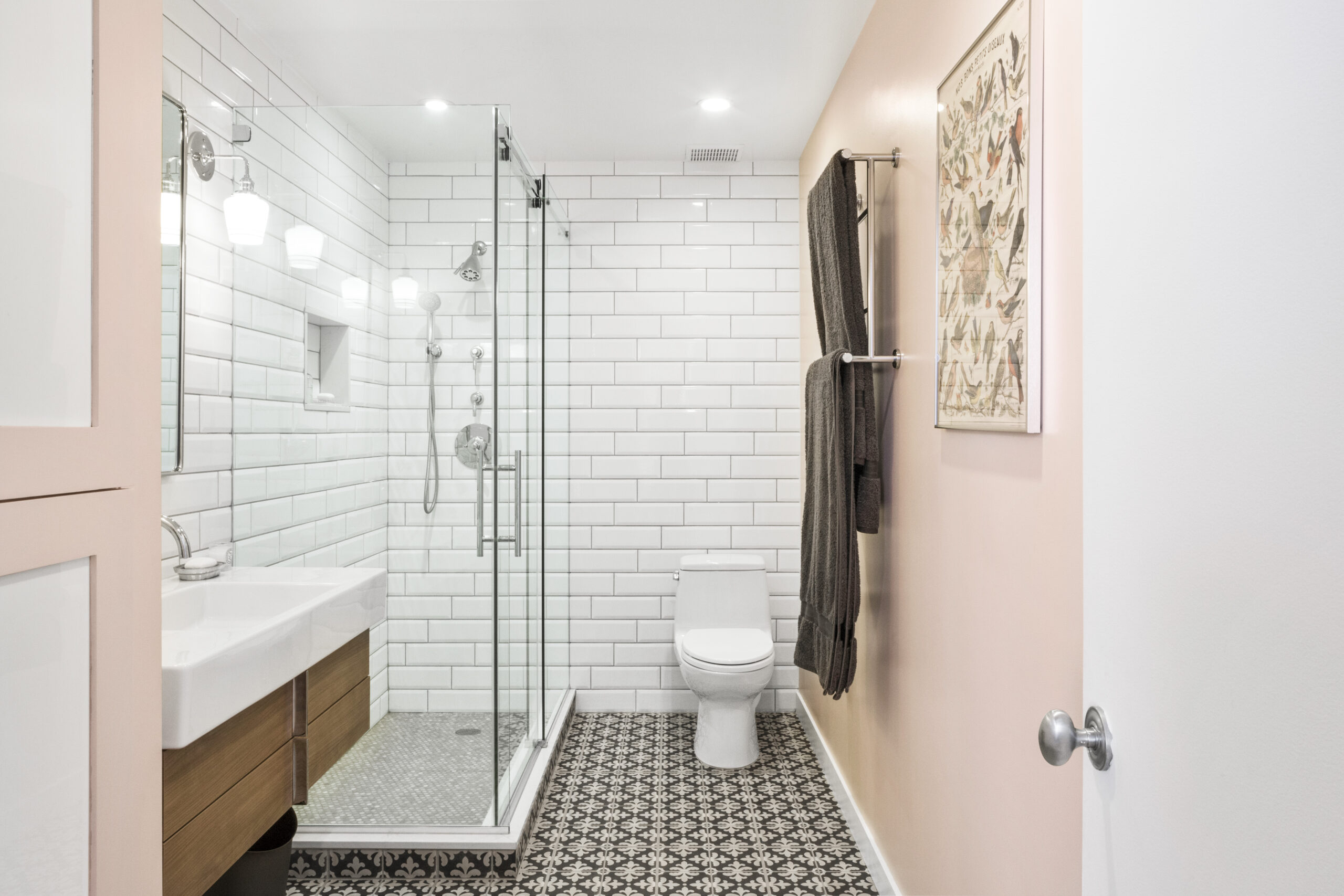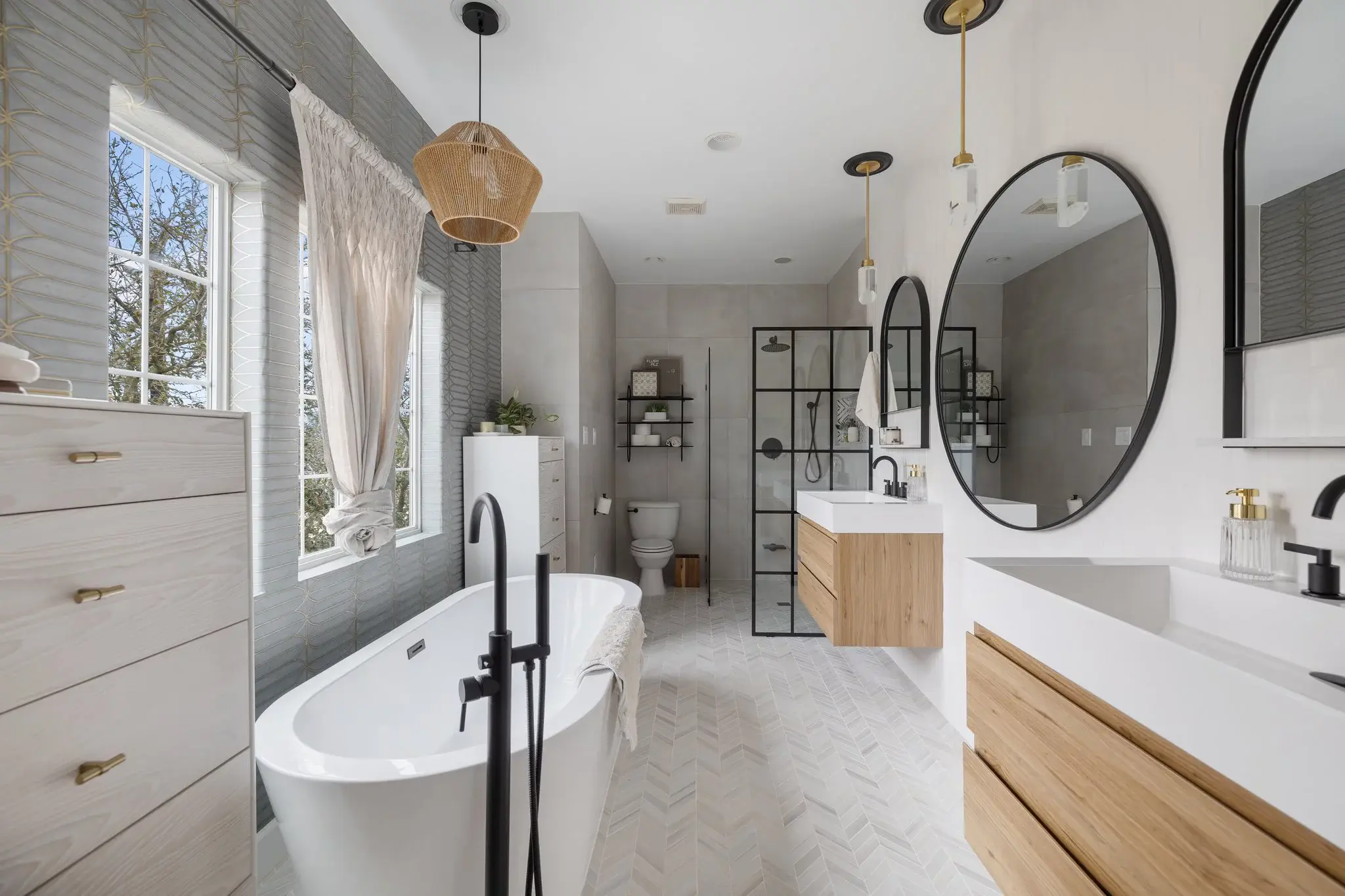Home / Blog / Home Renovation Cost Guides
Understanding Different Bathroom Remodeling Costs on Long Island
Planning a bathroom remodel on Long Island in 2025?
Understanding the potential costs upfront is more critical than ever in today’s dynamic economic environment. This updated guide breaks down the key factors influencing the price tag of your project, from the size of your space and the quality of materials to labor expenses.
We’ll also delve into newer elements impacting remodeling budgets in 2025, such as evolving tariffs on imported materials and the potential effects of a fluctuating dollar.
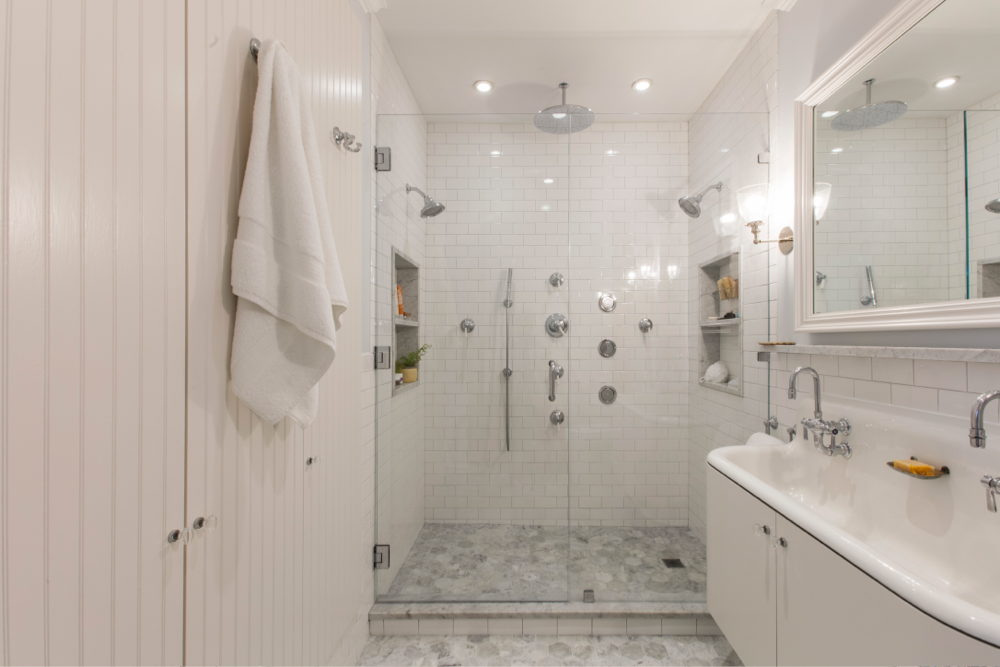
How much should you budget for your bathroom remodel? Here’s how to make a rough prediction of bathroom remodeling costs on Long Island. The main variables are:
- Size of your bathroom, typically determined by the number of bathroom fixtures and the room’s square footage.
- Finish level — from budget to luxury, of all the materials, fixtures and finishes for your renovation.
- Scope — Are you just replacing fixtures and finishes? Are you changing the floor plan, including moving walls and utilities? Are you adding a new bathroom, or moving your bathroom to a different part of the house?
- Services — Do you just need construction work? Do you need professional design or architecture services?
At Sweeten, we’re experts at all things general contractors. Here’s how Sweeten works: We pre-screen them for our network, carefully select the best ones for your remodeling project, and work closely with hundreds of general contractors every day.
We’ll discuss these variables below, but for now let’s start with an example.
For a full renovation (without layout changes) of a standard full bathroom, with basic general contracting services, here’s what you can expect starting costs for your project to look like on Long Island:
- Budget Full Bathroom Renovation: Starting at $18,025 – $18,725+ (reflecting a potential 3-7% increase from $17,500)
- Mid-Grade Full Bathroom Renovation: Starting at $27,810 – $28,890+ (reflecting a potential 3-7% increase from $27,000)
- High-End Full Bathroom Renovation: Starting at $40,170 – $41,730+ (reflecting a potential 3-7% increase from $39,000)
Post your project on Sweeten for free and make your dream renovation a reality. Sweeten simplifies home renovation by connecting homeowners with top-rated general contractors, handling the vetting process and project management. To learn more about how we can help, check out our home renovation services.
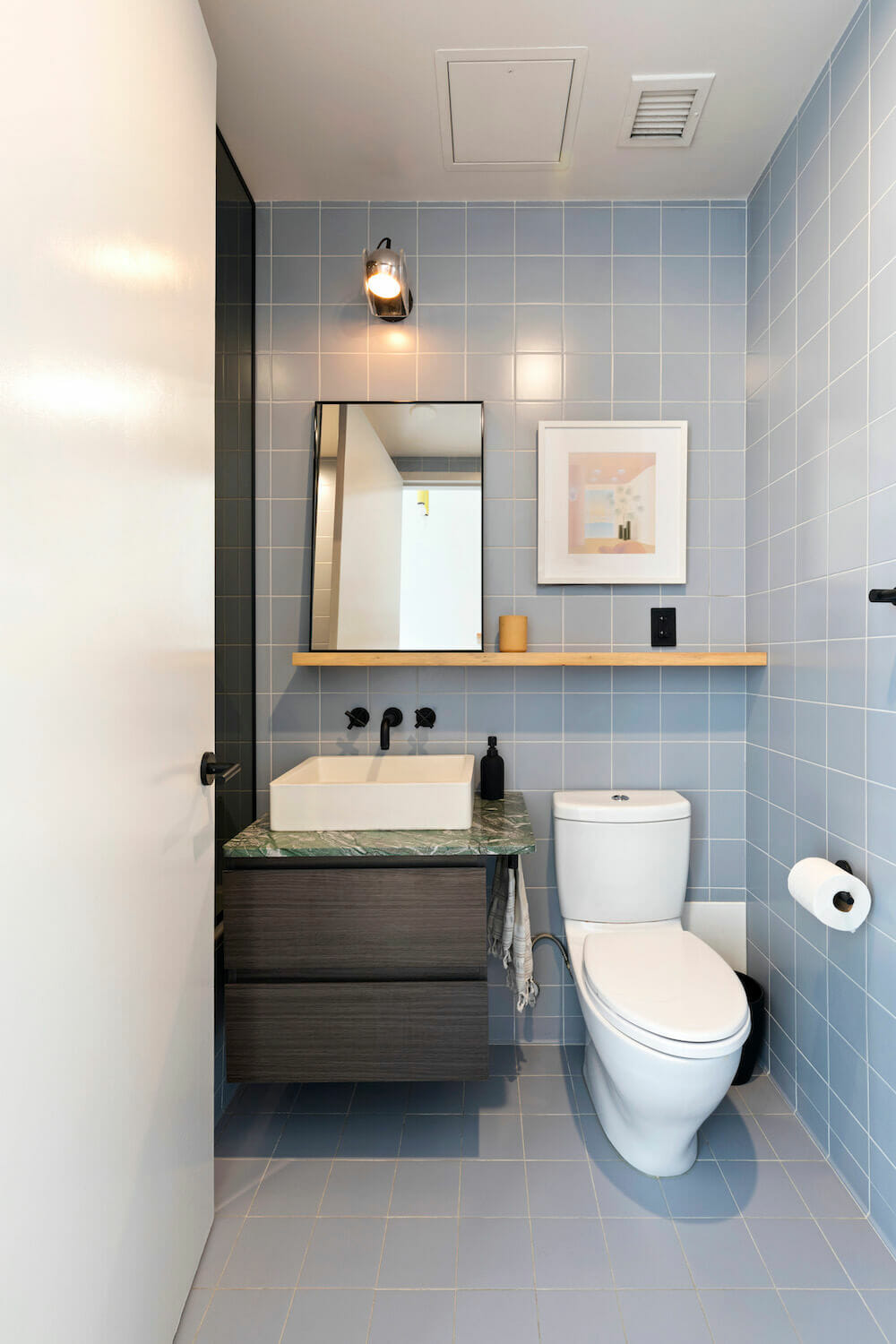
We want you to be completely prepared for the cost of your home remodeling project, so our pricing estimates are inclusive of all materials, labor, overhead, and a standard general contractor’s margin.
When you’re ready to get started on your bathroom or home remodel, work with Sweeten to renovate with the best contractors on Long Island.
Size: How dimensions affect your bathroom remodeling costs on Long Island
Bathroom size matters, but it’s not the whole story. The number and complexity of fixtures (sinks, showers, toilets, etc.) significantly impact costs. Think of it this way: larger bathrooms often mean more plumbing and finishes, which can drive up the price.
Half Bathrooms (Powder Rooms) are typically small and feature a sink and toilet. With a fixture count of 1-2, they generally have lower costs compared to full or primary bathrooms.
Full Bathrooms typically include a sink, toilet, and either a bathtub or shower. The fixture count ranges from 3 to 4, making them moderately priced. Costs can vary based on the quality and style of fixtures chosen.
Primary Bathrooms, also known as master bathrooms, often feature a double sink vanity, toilet, and bathtub or shower. With a fixture count of 4-5, they tend to be more expensive than full bathrooms, especially when premium fixtures are selected.
Deluxe Primary Bathrooms offer luxurious amenities like double sink vanities, extra-large showers or separate tubs and showers, and enclosed toilets. With a fixture count of 5 or more, they are typically the most expensive option.
Fixture Costs can vary widely. A small bathroom with basic fixtures may cost around $1,500, while luxury fixtures and finishes in larger bathrooms can exceed $15,000. These are general estimates, and actual costs can be influenced by factors such as labor costs and regional pricing differences.
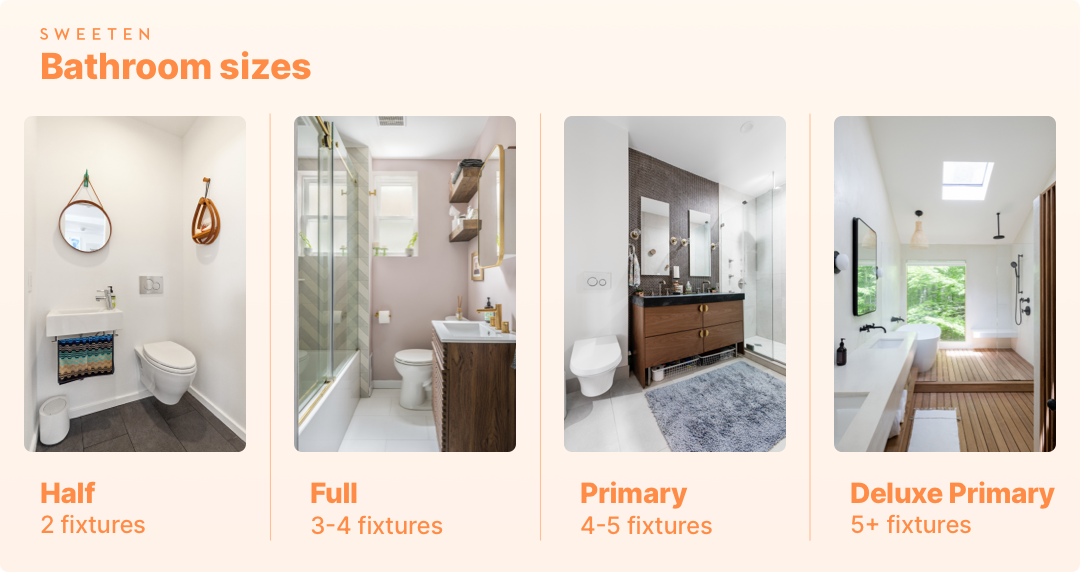
Finish level: How bathroom design affects remodeling costs on Long Island
Finish level refers to the general quality and price level of fixtures, materials, and finishes. These include wall treatments, vanity materials and fabrication, flooring choices, and the brands and models of sinks, faucets, and fixtures you choose. The higher the finish level, the faster your costs will increase.
Budget Finish:
- Materials: Off-the-shelf options from big-box stores and IKEA.
- Examples: Stock vanities, budget tiles (Pergo, Daltile), Delta, Moen, Pfister fixtures.
Mid-Grade Finish:
- Materials: Balance affordability with quality.
- Examples: Design House, Fresca, Signature Hardware vanities; TileBar tile; American Standard, Hansgrohe, Kohler fixtures.
High-End Finish:
- Materials: Premium quality and craftsmanship.
- Examples: Clé Tile, Ann Sacks, Artistic Tile; Duravit, Robern, DXV vanities; Kallista, Brizo fixtures.
Luxury Finish:
- Materials: Highest quality, customization, and craftsmanship.
- Examples: Lefroy Brooks, THG Paris, Samuel Heath.
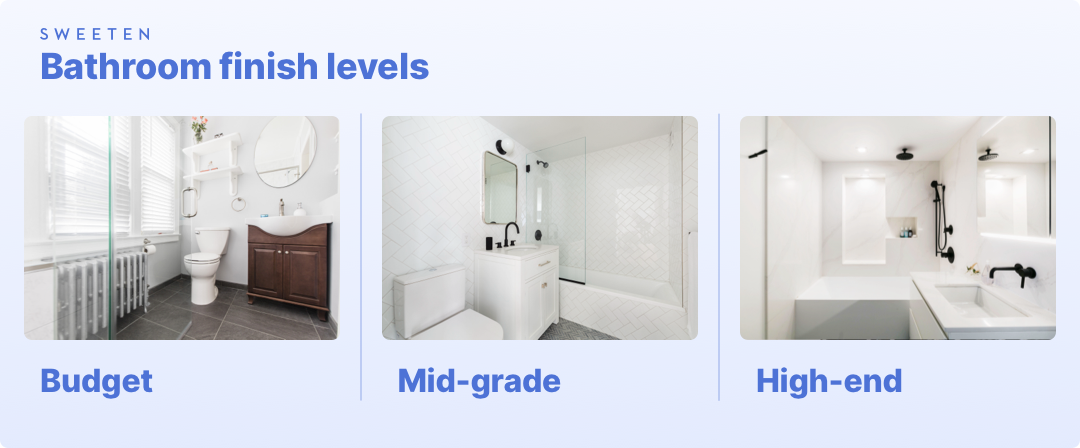
Scope: Rip-and-replace vs. gut bathroom renovation on Long Island
Project scope refers to the amount and type of work that needs to be done, and can have implications on which professionals you’ll need to hire. We divide scope into the following broad categories (when a contractor prepares an estimate for your renovation, it will be much more detailed, and will include costs of the exact fixtures and finishes): Sweeten brings homeowners an exceptional renovation experience by personally matching trusted general contractors to your project, while offering expert guidance and support—at no cost to you. Renovate expertly with Sweeten
Full renovation (also called “rip-and-replace”)
A full renovation means that you’re replacing all old fixtures and finishes with new ones, while leaving everything in place. So, effectively, the layout is the same before and after the renovation (hence, the nickname “rip-and-replace”). This is the more straightforward way to reimagine your space, and can often be done with just a licensed general contractor partner.
Gut renovation
A gut renovation involves a complete overhaul of the bathroom, stripping it down to the studs and subfloor (or even removing them entirely). This allows for a significant redesign, including changes to the layout, plumbing, and electrical systems. Such a transformative project requires professional design and architectural services, permits, and licensed general contractors to ensure safety, code compliance, and a successful outcome.
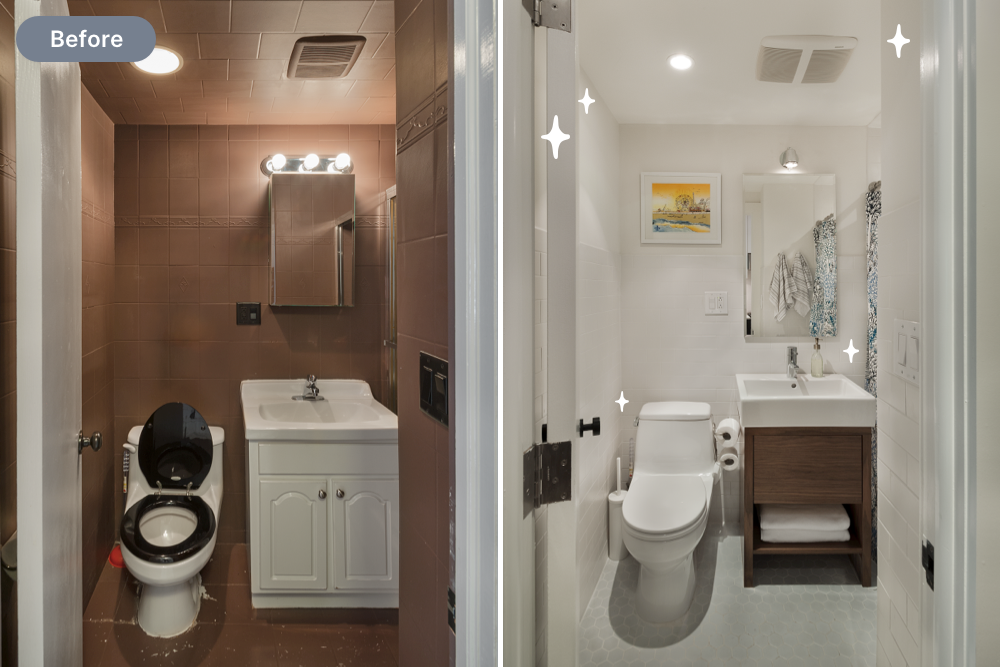
Services: Bathroom remodeling services, and how they affect costs on Long Island
The two main services to consider for your bathroom renovation are build service and design service. Depending on your needs, you have some options for what types of firms to hire.
Build Service with a General Contractor
- Scope: Demolition, construction, and project management.
- Service Levels:
- Build-Only: Works with pre-existing design plans.
- Limited Design: Offers basic design suggestions and advice.
- Full-Service: Provides comprehensive design and construction services.
- Pricing: Factors include experience, firm size, overhead, and service level.
- Recommendation: Consult multiple contractors to find the best fit.
Design Service with an Architect or Interior Designer
- Creative Design: Reimagining the space (optional).
- Cost: Typically 10-20% of construction budget.
- Technical Design: Ensures safety and code compliance (required for gut renovations).
Full-Service, Design-Build Firms
- Benefits:
- Seamless coordination between design and construction.
- Potential for cost savings and time efficiency.
- Single point of contact for the entire project.
- Process: Hiring a firm that provides both design and build services.
Examples:
- Build-Only Contractor: A firm that specializes in construction and requires clients to provide complete design plans.
- Limited Design Contractor: A firm that offers basic design assistance, such as material selection or layout suggestions.
- Full-Service Design-Build Firm: A company that provides both design and construction services, from initial planning to project completion.
- Creative Designer: An interior designer or architect who specializes in creating aesthetically pleasing and functional spaces.
- Technical Designer: An architect or structural engineer who ensures that a project complies with building codes and safety regulations.
What is a full-service, design-build firm?
If you need both design and build services, you can choose to hire a professional designer or architect, and separately, a general contractor. But there’s another option that comes with some distinct benefits: you can hire a design-build firm — a general contractor with dedicated professional design under one roof. This means you work with the same firm from planning and design through construction. In addition to the continuity, which can often save time in the process, some clients appreciate that the working relationship means more seamless coordination, which can even help to keep your project on budget.
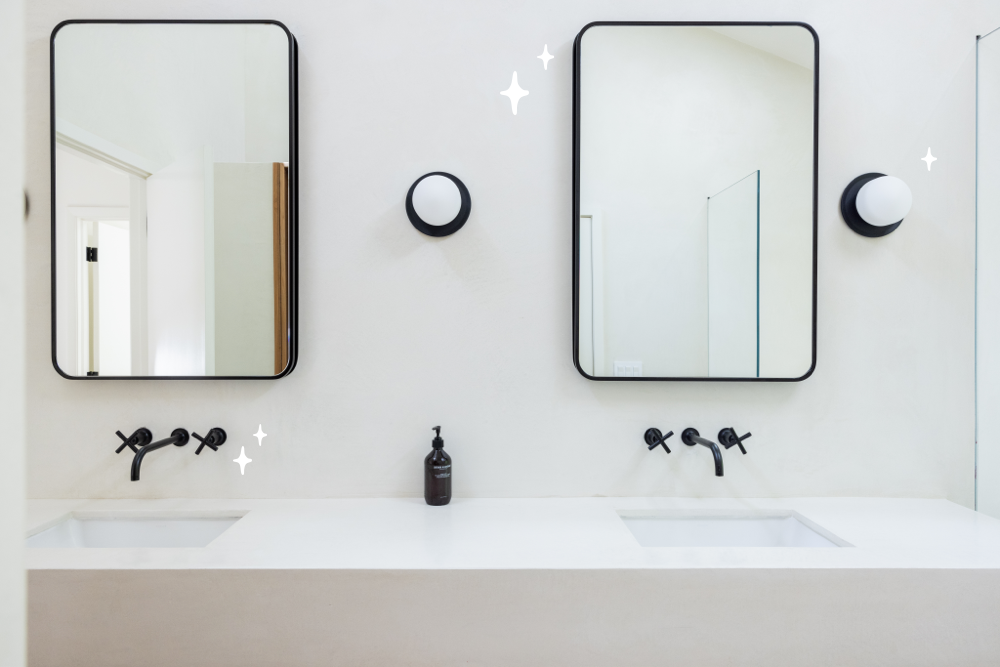
We can help plan your renovation
Find endless home renovation inspiration, detailed guides, and practical cost breakdowns from our blogs. You can also post your project on Sweeten today and get matched with our vetted general contractors and get estimates for free!
FAQs about bathroom remodeling on Long Island
The process of remodeling a bathroom brings up endless questions, so we’re answering some of your most common curiosities about the costs of bathroom renovations here. Have more questions? Leave them in the comments section below!
The final cost of a bathroom remodel will depend on the size of your bathroom, the quality of fixtures and finishes, and whether any plumbing fixtures will be moving or changing. For an average, full bath, a full, rip-and-replace bathroom remodel on Long Island will range from $17,500 to $71,000 and up, depending on finishes. This estimate includes all materials, labor, overhead, and a standard general contractor margin.
A major gut bathroom remodel would add an additional 15-25% to the total cost of materials and labor for the same square footage. Also keep in mind that a half bathroom with fewer fixtures will cost less, while a primary bathroom with more fixtures will cost more.
Demolition signifies the start of a renovation and is one of the quickest parts of the process to complete. Bathroom demolition costs are typically tied to the square footage of what is being removed. Usually, bathroom demolition costs start at $37 per square foot on Long Island, but can be more depending on what needs to be removed.
The cost of labor for a bathroom remodel goes towards the renovation crew, behind-the-scenes administrative employees, and subcontractors. Generally, the cost of labor is dependent on a project’s complexity, size, and location. Based on Long Island averages, the labor portion of a bathroom remodeling project usually adds up to around 25-35% of the total project cost, give or take.
Generally speaking, labor will make up a larger portion of total cost for a bathroom project with budget-grade materials, and a lower portion of the total for high-end materials. The addition of any highly specialized labor (beyond standard) will cost more.
Permit requirements vary between states and local municipalities, so be sure to check your local requirements in on Long Island. Often, permits are needed for bathroom remodels if any plumbing, electrical, or mechanical elements will be moved, or if load-bearing walls are being moved or coming down. This can also include converting a tub to shower, or vice versa, due to plumbing implications.
If you need a permit for your bathroom remodel, the costs can be calculated as a flat rate for specific scopes of work or as a percentage of the cost of the project. In some areas remodeling permit costs might be as high as 10%, but it’s usually less.
The purchase of tile is only part of the budget to tile a bathroom. There is cost to prepare the space for tiling where items such as baseboards and the toilet are removed. Raw materials, such as subflooring and thin-set, are required for the job. Installation and labor costs factor into the final tiling budget. The total average cost to tile a bathroom on Long Island ranges from $25 to $79 per square foot.
The cost to replace a bathroom vanity includes preparation of the worksite, raw materials, and labor. Depending on the scope of work, the cost increases if plumbing and electrical systems are relocated or if they need to be brought up to code. The materials chosen based on price point will also factor into the budget. The total average cost to replace a vanity on Long Island ranges from $420 to $3,600, however, for high-end and custom work, the total cost of replacing a vanity can run even higher.
Remodeling a walk-in shower can cost anywhere between $2,000-$15,000 on Long Island, and can run even higher for high-end and custom work, or major layout changes. This includes installation, plumbing, fixtures, and kits. Leaving the plumbing where it is will be less expensive than if water sources are moved (like when converting a tub to a shower).
The cost to remodel a shower will also vary depending on the price point of the tile chosen. Standard ceramic tile can start at just $1.50 per square foot while marble tile is closer to $50 per square foot. Add a standard overage amount of at least 10% of raw material. Running short of tile will cause delays and incur more costs
The bulk of your bathroom remodeling costs will be tied to the total number of fixtures, and the quality of the fixtures and materials you choose. A small full bathroom with 3-4 fixtures and a large full bathroom with 3-4 fixtures, might cost close to the same because the only difference will be in square footage of flooring and wall treatments. On the other hand, a half bathroom with only 2 fixtures, a sink and toilet, will cost considerably less than a full bath renovation with 3-4 fixtures.
On Long Island, the cost for a typical half bathroom remodel can range from $7,000-$26,000 and up; whereas the cost for a full, rip-and-replace remodel of a small full bathroom can range from $17,500-$71,000 and up, depending on finish level of the materials used. A major gut renovation for a bathroom of the same size would add an additional 15-25% to the total cost of materials and labor.
Your general contractor can give you an idea of possible issues that may arise during a bathroom remodel on Long Island, based on the age and type of home they’re working on. However, a contractor cannot price out every possible problem, as things can arise after walls are broken into. They may discover an issue with your plumbing or electrical, for example.
Major projects often involve permitting fees, and change orders after a contract has been signed can also add to the overall cost. To protect yourself from unseen costs, set aside a 10-15% contingency budget for a non-gut renovation. If you are planning a gut remodel, set aside 15-20% for issues that come up along the way. Having a monetary cushion will keep your remodeling project on track.
Read more cost guides below:
